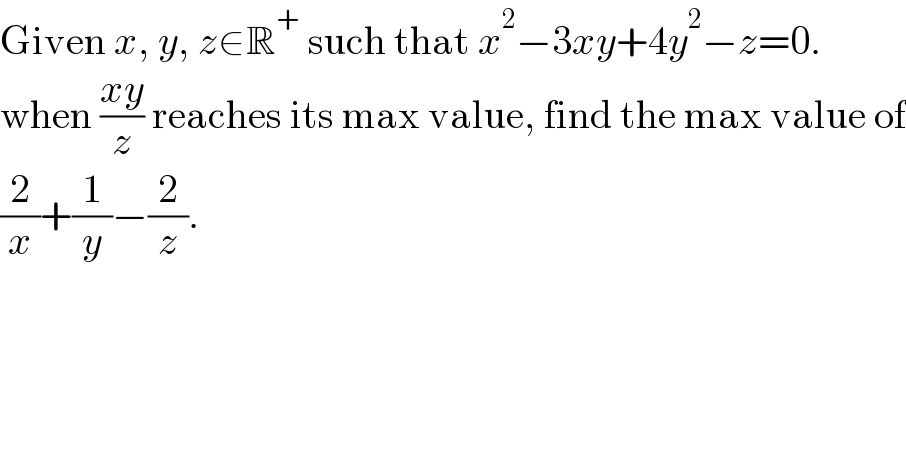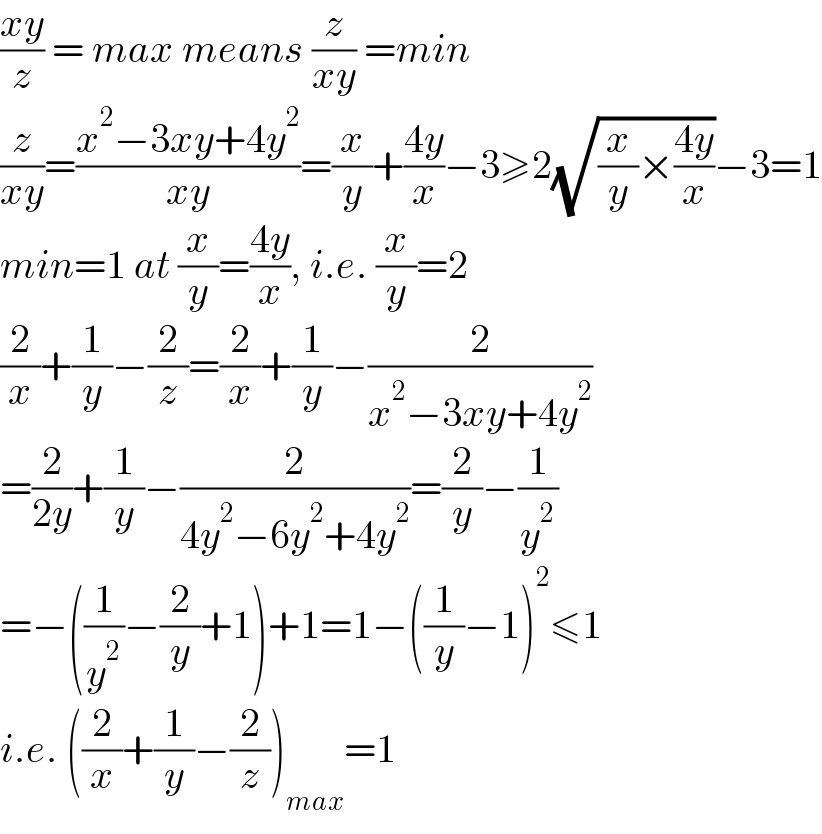
Question Number 180728 by CrispyXYZ last updated on 16/Nov/22

$$\mathrm{Given}\:{x},\:{y},\:{z}\in\mathbb{R}^{+} \:\mathrm{such}\:\mathrm{that}\:{x}^{\mathrm{2}} −\mathrm{3}{xy}+\mathrm{4}{y}^{\mathrm{2}} −{z}=\mathrm{0}. \\ $$$$\mathrm{when}\:\frac{{xy}}{{z}}\:\mathrm{reaches}\:\mathrm{its}\:\mathrm{max}\:\mathrm{value},\:\mathrm{find}\:\mathrm{the}\:\mathrm{max}\:\mathrm{value}\:\mathrm{of} \\ $$$$\frac{\mathrm{2}}{{x}}+\frac{\mathrm{1}}{{y}}−\frac{\mathrm{2}}{{z}}. \\ $$
Answered by mr W last updated on 20/Nov/22

$$\frac{{xy}}{{z}}\:=\:{max}\:{means}\:\frac{{z}}{{xy}}\:={min} \\ $$$$\frac{{z}}{{xy}}=\frac{{x}^{\mathrm{2}} −\mathrm{3}{xy}+\mathrm{4}{y}^{\mathrm{2}} }{{xy}}=\frac{{x}}{{y}}+\frac{\mathrm{4}{y}}{{x}}−\mathrm{3}\geqslant\mathrm{2}\sqrt{\frac{{x}}{{y}}×\frac{\mathrm{4}{y}}{{x}}}−\mathrm{3}=\mathrm{1} \\ $$$${min}=\mathrm{1}\:{at}\:\frac{{x}}{{y}}=\frac{\mathrm{4}{y}}{{x}},\:{i}.{e}.\:\frac{{x}}{{y}}=\mathrm{2} \\ $$$$\frac{\mathrm{2}}{{x}}+\frac{\mathrm{1}}{{y}}−\frac{\mathrm{2}}{{z}}=\frac{\mathrm{2}}{{x}}+\frac{\mathrm{1}}{{y}}−\frac{\mathrm{2}}{{x}^{\mathrm{2}} −\mathrm{3}{xy}+\mathrm{4}{y}^{\mathrm{2}} } \\ $$$$=\frac{\mathrm{2}}{\mathrm{2}{y}}+\frac{\mathrm{1}}{{y}}−\frac{\mathrm{2}}{\mathrm{4}{y}^{\mathrm{2}} −\mathrm{6}{y}^{\mathrm{2}} +\mathrm{4}{y}^{\mathrm{2}} }=\frac{\mathrm{2}}{{y}}−\frac{\mathrm{1}}{{y}^{\mathrm{2}} } \\ $$$$=−\left(\frac{\mathrm{1}}{{y}^{\mathrm{2}} }−\frac{\mathrm{2}}{{y}}+\mathrm{1}\right)+\mathrm{1}=\mathrm{1}−\left(\frac{\mathrm{1}}{{y}}−\mathrm{1}\right)^{\mathrm{2}} \leqslant\mathrm{1} \\ $$$${i}.{e}.\:\left(\frac{\mathrm{2}}{{x}}+\frac{\mathrm{1}}{{y}}−\frac{\mathrm{2}}{{z}}\right)_{{max}} =\mathrm{1} \\ $$
